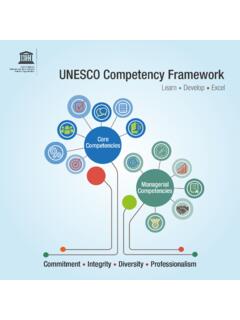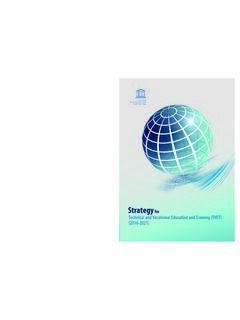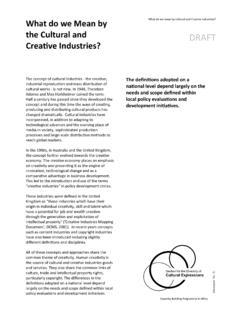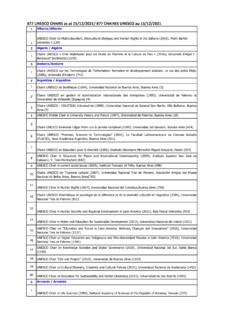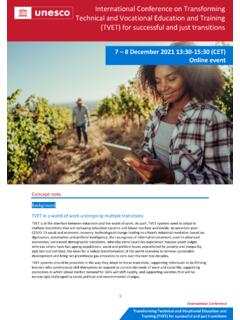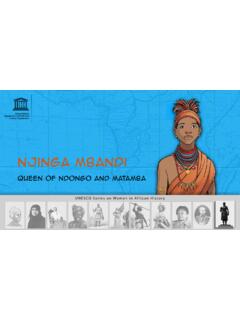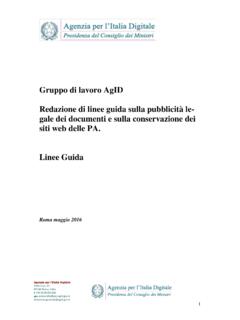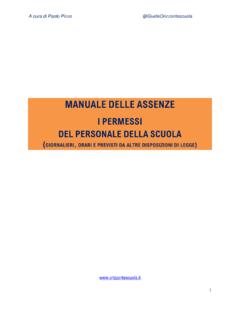Transcription of UNESCO moving forward the 2030 Agenda for Sustainable ...
1 SustainableDevelopmentGoalsUnited NationsEducational, Scientific andCultural OrganizationUNESCO moving forward the 2030 Agendafor Sustainable DevelopmentUNESCO Task Force on the 2030 Agenda for Sustainable collective commitment to the 17 Global Goals is our most important defense in ensuring that the benefits of our modernizing world are shared among all nations and people and not just by the privileged few. These goals are intended to serve the interest of every woman, man, and child on our planet. And that means that achieving these goals is up to all of us. This has to be an international movement a coming together of people and a rallying around a common cause on a global scale. I believe that UNESCO , through its specialized expertise in education, the sciences, culture, communication and information, is very well positioned to support countries in making these Global Goals a reality for all.
2 SustainableDevelopmentGoalsUnited NationsEducational, Scientific andCultural OrganizationForest Whitaker UNESCO Special Envoy for peace and reconciliation, United Nations Sustainable development Goals AdvocateUNESCO Task Force on the 2030 Agenda for Sustainable UNESCO , 2017 Published in 2017 by the United Nations Educational, Scienti c and Cultural Organization7, place de Fontenoy, 75352 Paris 07 SP, FranceThis publication is available in Open Access under the Attribution-ShareAlike IGO (CC-BY-SA IGO) license ( ). By using the content of this publication, the users accept to be bound by the terms of use of the UNESCO Open Access Repository ( access/terms-use-ccbysa-en).The designations employed and the presentation of the material in this publication do not imply the expression of any opinion whatsoever on the part of UNESCO concerning the legal status of any country, territory, city or area, or of its authorities, or concerning the delimitation of its frontiers or publication was prepared by the Bureau of Strategic Planning/Section for Cooperation with the UN System, with valuable contributions from all programme sectors, the Africa Department, the Division for Gender Equality, UNESCO s Institute for Statistics, the O ce of External Relations and Public Information and the O ce of the Foreword by the Director-General2 Introduction3 The principles of the 2030 Agenda4 UNESCO s two global priorities.
3 Gender Equality & Africa5 UNESCO supports the data revolution across the SDGs6 UNESCO s direct contribution to nine SDGs8 Inclusive quality education and lifelong learning for all14 Understand social transformations for peaceful, inclusive and right-based societies10 Harness science, technology, innovation and knowledge16 Culture as a driver and enabler for Sustainable development12 Protect and sustainably manage the ocean18 Freedom of expression and universal access to information and knowledge Christian Mueller / ShutterstockBSP-2017/WS/1 CLD by the Director-GeneralThe United Nations 2030 Agenda for Sustainable development , with its 17 Sustainable development Goals, sets forth a bold new framework for development cooperation over the next 15 years.
4 This Agenda aspires to ensure prosperity and well-being for all women and men, while protecting our planet and strengthening the foundations for peace. The Sustainable development Goals represent the most universal, ambitious and comprehensive Agenda ever seen, to leave no one is a paradigm shift that requires us all to act in new ways. All 17 Sustainable development Goals are connected this places a premium on comprehensive approaches, on partnership, on linking polices and action. moving forward , the Agenda must build on national ownership and on the mobilization of e ective action and resources at the national, regional and global , integration, and universality -- these are the hallmarks of the new Agenda . Soft power is essential to taking it is the importance of UNESCO s universal mandate to contribute to the building of peace, the eradication of poverty, Sustainable development and intercultural dialogue through education, the sciences, culture, communication and information.
5 Human rights and dignity are the starting point of the Organization s action and the criteria for assessing its results, with a focus on the most disadvantaged and excluded groups, as well as countries and segments of societies furthest behind. UNESCO mainstreams speci c interventions for youth, Least Developed Countries, Small Island Developing States, and marginalized social and ethnic groups, including indigenous peoples and local communities, while giving global priority to promoting gender equality and to supporting countries in Africa in all of its programmes. The Organization also places emphasis on action with countries in con ict and crisis, or a ected by disasters, to build is bringing all its weight to supporting countries through new, innovative and integrated approaches to reach the goals they set for themselves from advancing inclusive quality education for all to promoting integrated water resources management, ocean sustainability and protection of biodiversity, from advancing Sustainable cities, deepening social inclusion, mitigating and adapting to climate change, to preventing violent extremism and cultural cleansing and defending freedom of expression and media development .
6 Data is vital to all this. The Organization is responsible for collecting and disseminating data on the global and thematic indicators needed for the review and follow-up of many of these goals. While focusing on the 9 Sustainable development Goals that have direct relevance to UNESCO s mandate the Organization s action will impact across all new support countries in embedding the Sustainable development Goals into national plans and budgets, and support follow up and review, UNESCO is acting across the board. This starts with providing demand-driven, evidence-based normative and policy advice in its areas of competence and delivering capacity building, including on data collection and analysis. It includes also convening multi-stakeholder partnerships, and supporting South-South and North-South-South cooperation.
7 I have created a dedicated Task Force on the 2030 Agenda , to ensure sharp, e ective and coordinated action for countries as they take forward , implement and review the new momentum towards the Sustainable development Goals is a human rights imperative, a development imperative, and a peace imperative this is about delivering on the collective promise we made, as the United Nations, as Governments, as the wider public, to build a better future for all. It is our responsibility now to meet expectations, to do everything to translate promises into reality. This is UNESCO s pledge now, and in the years to Bokova Director General of UNESCOUNESCO is bringing all its weight to supporti ng countries through new, innovati ve and integrated approaches to reach the goals they set for UNESCOUNESCO moving forward the 2030 Agenda for Sustainable Development1 IntroductionUNESCO actively contributed to the shaping of the 2030 Agenda for Sustainable development adopted by the UN General Assembly in 2015 drawing on its humanist mandate, and mobilizing all of its partners and stakeholders.
8 Designed as an Agenda of the people, by the people and for the people, it highlights the vital importance of human capacities, skills and knowledge to adapt and respond to the challenges and opportunities of the present and the future, many of which are still unknown. It places national ownership and support at the country level as a cornerstone for its successful implementation. Building upon the achievements and lessons learned of the Millennium development Goals (MDGs), it seeks to address their un nished business. The 2030 Agenda is a universal roadmap that is strategically linked to the Sendai Framework for Disaster Risk Reduction, the Paris Climate Change Agreement, the Addis Ababa Action Agenda and the Quito Declaration on Sustainable Cities and Human Settlements for 2030 Agenda gives new impetus to UNESCO s actions at the global, regional and national levels.
9 It gives pride of place to the fundamental contribution of quality, inclusive education at all levels and to the importance of lifelong learning opportunities for all (SDG 4). It breaks new ground in acknowledging the growing importance of science, technology and innovation (STI) for Sustainable development (SDG 9). It contains ambitious goals in the areas of freshwater (SDG 6), biodiversity (SDG 15), the ocean (SDG 14), and climate change (SDG 13), which are major priorities for the Organization. It recognizes the role of public access to information and the safety of journalists in accelerating development opportunities and in promoting good governance and the rule of law (SDG 16). It promotes culture, through heritage and creativity, as a key enabler of Sustainable development .
10 It acknowledges the value of creating inclusive, safe, resilient and Sustainable cities, and contains targets on the preservation of natural and cultural heritage (SDG 11), as well as on the recovery and return of stolen assets (SDG 16), which also include the illicit tra cking of cultural objects. It upholds a vision of just, peaceful, equitable and inclusive societies recognizing the value of knowledge, heritage and diversity. It promotes human rights and has a strong focus on gender equality (SDG 5). UNESCO is transforming the way it works to e ectively support Member States in the delivery of the 2030 Agenda , including through expanding its multi-stakeholder partnerships; transitioning towards a structured nancing dialogue to support comprehensive, integrated participatory planning on nancing priorities and needs; working in close partnership with the UN system at large in delivering on the 2030 Agenda ; and improving public access to quality data about its work as a key component of its commitment to strengthening transparency and accountability.
